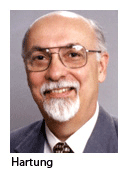With Dr. Bruce Hartung
I thought two columns on social media would be enough, at least for the short-term. (See www.lcms.org/?18126 and www.lcms.org/?18269.) The readers of this column had different thoughts, though. Responses abound. Obviously, this is an important concern. So, in this column, I’ll share some resources that might be helpful.
Q: The purpose of my e-mail is simply to alert you and those who debate on the side of social networking as a private activity that there are many companies that are producing products to help entities ensure the protection and confidentiality of their communicated information …. The premise is that once the data traverses the public Internet it becomes public information, regardless of whether your network is private.
A: The point here is one that I have come to accept, albeit reluctantly. When we put our information on the Internet, there is little, if any, privacy and so i t becomes public information.
t becomes public information.
In a Jan. 5 New York Times Magazine article, “Cyberspace When You’re Dead,” author Rob Walker wonders about the long-range implications of recording many details of our lives and expressing ourselves directly and completely in the public space of the Internet. These postings are similar to the way we formerly expressed ourselves in face-to-face conversations, but the latter left no trace except in the memories of the parties involved.
Walker suggests that “digital litter” surrounds us and, in some ways, there is no telling how that litter will create pictures of who we are, while living, and who we used to be, after we have died. In any case, it is all public.
This leads me to a congregational situation, as follows.
Q: At one time our congregation had an open Facebook account. Members could post comments on the congregation’s Facebook page, which was open to the public. A disgruntled member posted a comment about the “pagan” members of our church. … We shut down the Facebook account.
A: This reminds me of a pastor who previously e-mailed me to discuss how some members of his new church plant were monitoring blogs by others concerning the congregation’s efforts to mobilize unreached people to form a worshipping community. The pastor told me that, as a result of the blogs — which included negative comments — it is possible that if someone does an Internet search for information about the new church plant, the negative responses could show up high on the list. That might cause someone with an interest in joining the new congregation to lose that interest and keep looking for a new church home. In that way, private opinions become public and may hinder the work of the Holy Spirit, he thought.
Q: Read any good books on this subject?
A: In all candor, I am such a novice about this subject that I have not. But I have read reviews of some books that sound helpful, including Evgeny Morozov’s The Net Delusion: The Dark Side of Internet Freedom. His reviewer, Lee Siegel, begins: “Just a few years ago, all anyone could talk about was how to make the Internet more free. Now all anyone can talk about is how to control it” (The New York Times; Feb. 2, 2011).
Also, check out Elias Aboujaoude’s Virtually You: The Dangerous Powers of the E-Personality and Jane McGonigal’s Reality is Broken: Why Games Make Us Better and How They Can Change the World for some competing views of how dangerous all of this is. Let me know what you think.
Q: In addition to people, including pastors, descending into incivility on the Internet, there is a danger you have not mentioned: the rise of Internet pornography and so-called “sexting.” Do you have any resources to recommend?
A: There are a number, but Philip Carnes is one of the most outstanding authorities in this field. With others, he wrote In the Shadows of the Internet: Breaking Free of Compulsive Online Sexual Behavior. It is a must-read for all church workers, parents and anyone who is trapped in Internet addictions of any kind.
Another great resource is the website www.xxxchurch.org.
Rev. Bruce M. Hartung, Ph.D., is dean of Ministerial Formation at Concordia Seminary, St. Louis, and can be reached at hartungb@csl.edu.
Posted Feb. 24, 2011



